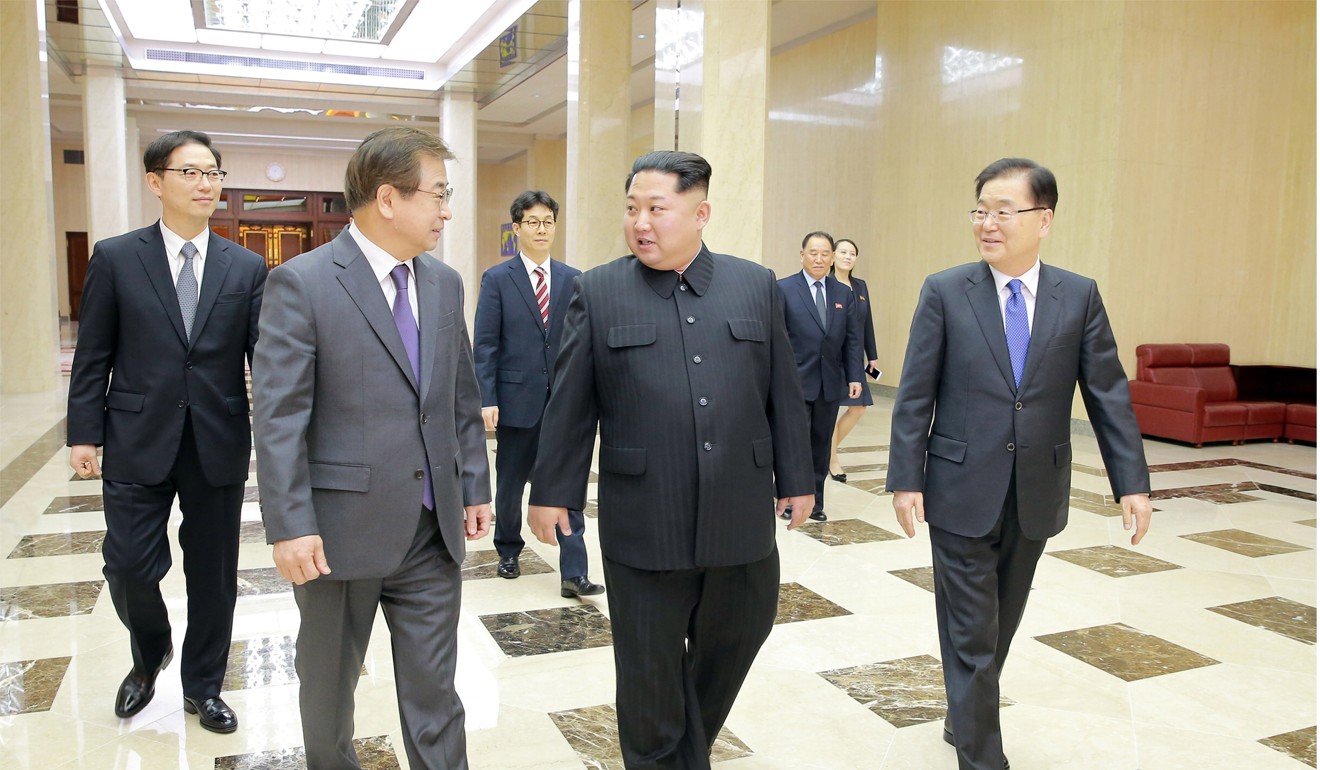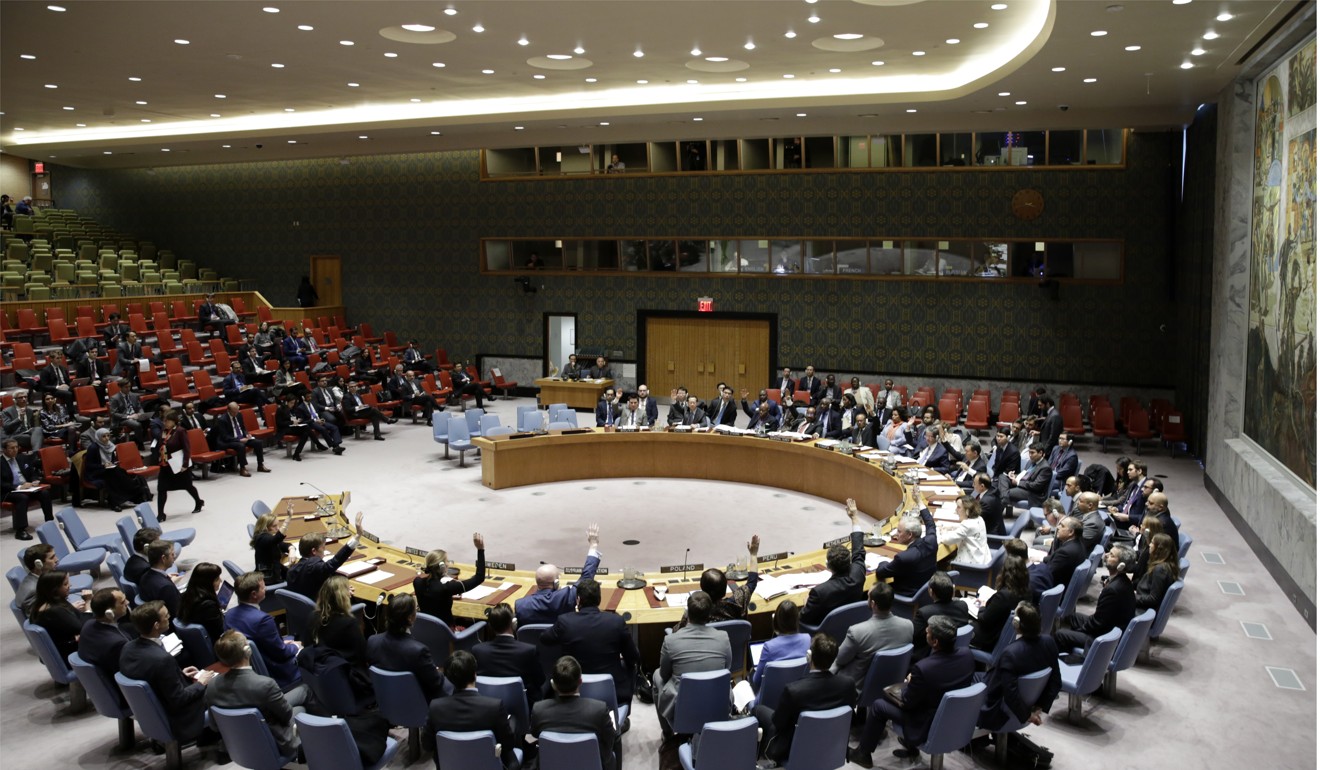
Donald Trump sees progress on nuclear crisis and praises North Korea’s ‘terrific’ Olympic effort
‘You’re going to find out very soon what’s happening,’ US president says in his most positive comments since start of diplomatic thaw at Pyeongchang Games
President Donald Trump called North Korea “terrific” in a shower of praise for Pyongyang’s participation in the Olympic Games and a suggestion that more progress in defusing the nuclear stand-off in Northeast Asia was around the corner.
“I thought North Korea was terrific. They went in to the Olympics. They went in with good spirit. They did well,” Trump said. “I think we’re having very good dialogue. You’re going to certainly find out very soon what’s happening.”

Speaking to reporters in Washington, Trump’s comments were the most positive yet by the administration in the diplomatic thaw that started at the Olympic Games in Pyeongchang, South Korea last month.
“The statements coming out of South Korea and North Korea have been very positive,” Trump said. “When they came in out of the blue and they said we’d love to participate in the Olympics, it made the Olympics very successful.”
North Korea will denuclearise if security guaranteed, says South
Trump’s comments followed news out of South Korea that its estranged neighbour to the north may be willing to abandon the nuclear weapons programme that has cast a threatening shadow over much of northeast Asia for the past year.
The missile tests and nuclear detonations prompted the US, Japan, China and Russia to cooperate on passing and enforcing a series of sanctions that have mostly cut off North Korea’s export income.
“The US strategy [of tightening sanctions], Chinese cooperation and a shift in South Korea’s strategy all played a role” in bringing North Korea to the negotiating table, Evan Medeiros, former special assistant to the president and senior director for Asian affairs at the US National Security Council, said in an interview with the South China Morning Post.
“I don’t think the North Koreans would be reaching out the way they have unless they saw some kind of opportunity in South Korea,” Medeiros said. “All three played a role. It was a mix of incentives and disincentives.”
Chung Eui-yong, national security adviser to South Korean President Moon Jae-in, said the North “made clear its willingness for the denuclearisation of the Korean peninsula, and made clear that there is no reason to own nuclear [programmes] if military threats towards the North are cleared and the security of its government is guaranteed”.
At a press conference after returning to Seoul from a meeting with North Korean leader Kim Jong-un, Chung said Kim is willing to discuss denuclearisation in talks with Washington, which could be the crucial concession needed to make the talks happen.
Chung said Pyongyang agreed to suspend nuclear and missile tests for as long as it holds talks with the US.
US and allies to wage high seas crackdown on ships helping N Korea
Trump’s praise for North Korea’s recent show of diplomacy came just 11 days after the White House announced the US’s “largest ever” sanctions package against Pyongyang, which targeted nearly 60 shipping and trading companies – many Chinese – in a bid to cut off foreign revenue that supports North Korea’s nuclear programme.
That action sought to block individuals and shipping companies using “illegal avenues” to evade UN Security Council resolutions already in place against North Korea.

Among other tactics, the latest set of sanctions by the US targeted about 30 vessels located, registered or flagged in North Korea, China (including Hong Kong and Taiwan), Singapore, Marshall Islands, Tanzania, Panama and Comoros.
The Security Council imposed three sets of sanctions on North Korea last year, all supported by China – Pyongyang’s traditional ally – to deprive Pyongyang of revenue for its development and testing of ballistic missiles that proved capable of reaching the US mainland.
Kim Jong-un can’t just wish away US role on Korean peninsula
The UN sanctions included prohibitions on North Korea’s most valuable exports, primarily coal and iron ore.
Japan reported to the UN several incidents of ship-to-ship cargo transfers involving North Korean vessels on the high seas this year, transactions that may have violated the international sanctions.
China’s foreign ministry spokesman, Geng Shuang, said Beijing would “seriously deal” with any Chinese individuals or enterprises found to be involved in one of these incidents.
The more diplomatic tone of recent days has contrasted sharply with the belligerent rhetoric Trump and Kim Jong-un traded last year after a series of North Korean missile tests.
In August, Trump threatened to hit North Korea with “fire and fury” if its government continued its missile tests.
State media in Pyongyang responded by outlining plans to fire missiles into the waters near the US Pacific territory of Guam, a few hundred kilometres south of the Korean Peninsula.
Still, the current shift in tone does not guarantee a long-term settling of tensions, said Medeiros, who is now a managing director of Eurasia Group, a Washington-based political risk consultancy.
Tillerson meets China’s top envoy as trade and North Korea tensions rise
“I’m not convinced that North Korea is actually committed to denuclearisation and is interested in talks about denuclearisation,” Medeiros said.
“All of Kim Jong-un’s actions and statements since he came to power were all about getting nuclear weapons for survival and political legitimacy and I don’t understand why that calculation would have changed in the last 24 hours.
“And remember, we’ve yet to hear from the North Koreans on this issue. All we’ve heard is South Korea’s interpretation of what has happened.”

